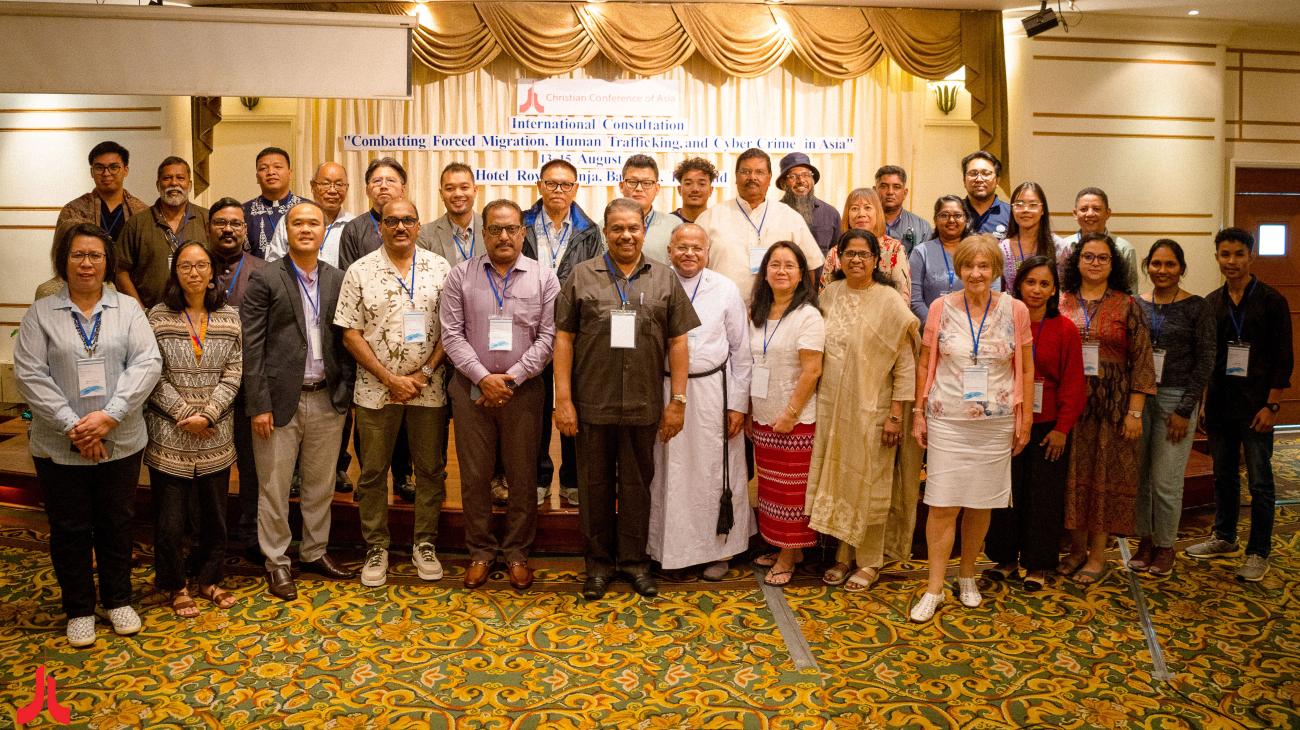“Combatting human trafficking and cybercrimes in Asia should be an urgent priority”, speakers of CCA’s international consultation affirm

Bangkok, Thailand: “Human trafficking and cybercrime have become the fastest-growing criminal enterprises in Asia, and Churches and the ecumenical community in Asia have the responsibility to join together with civil society, multilateral organisations, and governments to make every possible effort to combat human trafficking”, stated CCA General Secretary Dr Mathews George Chunakara.
Delivering the thematic address at the opening session of the international consultation on “Combatting Forced Migration, Human Trafficking, and Cybercrimes in Asia”, being held in Bangkok from 13 to 15 August 2025, Dr Chunakara presented an overview and background to the theme, setting the tone for the three-day consultation.
The consultation brings together thirty-five participants, including representatives of CCA member churches and councils, UN agencies such as UN Office on Drugs and Crime (UNODC), International Organization for Migration (IOM), international non-governmental organisations such as International Justice Mission (IJM), civil society organisations and experts in migration, trafficking, and cybersecurity.
The consultation is organised as part of the Christian Conference of Asia’s advocacy initiative, the Asian Ecumenical Migrant Advocacy Network (AEMAN).
Dr Mathews George Chunakara highlighted that human trafficking, particularly for cybercrime and the exploitation of mostly young people, is often carried out through deception or coercion. Even educated people are being lured or forced by organised syndicates into scam centres that are mainly operational in Southeast Asian countries.
Asian experiences show that these high-tech scam centres flourish mostly in environments of weak governance and widespread corruption, often with the collusion of officials. Their reach is now expanding beyond Asia into Africa, Latin America, and the Pacific Islands. Despite the scale of the problem, law enforcement mechanisms and international cooperation remain insufficient and inconsistent, noted the CCA General Secretary.
“Churches in Asia and the ecumenical community have the responsibility to contribute to efforts to combat human trafficking. We need to strengthen our existing networks and build wider ecumenical coalitions to work on this issue in Asia,” stressed Dr Chunakara.
Andrew Wasuwongse, Director of the International Justice Mission (IJM) Thailand, delivered a presentation on “Cybercrime in Asia and Trafficking Syndicates Nexus”, highlighting the scale and severity of the crisis.
Asian crime syndicates, he noted, are now leading global cyber-enabled fraud. In Cambodia and Myanmar alone, an estimated 220,000 people are forced to carry out online scams. Criminal syndicates in Southeast Asia are conservatively estimated to steal USD 64 billion annually from victims worldwide.
Mr Wasuwongse highlighted that public attention can prompt governments to take action, and advocacy is crucial in shining a light on these issues.
“We need global attention, global pressure, and a global response — in as many ways as possible. This is where the prophetic voice of the church must speak up to governments, urging them to use their power to protect, not to abuse or profit from crime,” urged Mr Wasuwongse.
He emphasised that strengthening advocacy and raising public awareness were essential strategies to drive meaningful action.
Dr Ricky Raymon, Regional Programme Officer for Trafficking in Persons and Smuggling of Migrants (TIP-SOM) at the UNODC Regional Office for Southeast Asia and the Pacific, focused the third thematic presentation on “From Recruitment to Ransom: Trafficking in Persons for Cybercrime”.
He began by presenting an overview of human trafficking, forced criminality, and recruitment models, emphasising that victims are often deliberately targeted due to their economic vulnerability.
Dr Raymon explained that structural factors such as gambling bans, limited law enforcement capacity, and widespread unemployment during the COVID-19 pandemic contributed to a surge in trafficking for forced criminal activities. Within the scam compounds, victims endure appalling conditions, including torture, confinement, severe punishments, and sexual exploitation, particularly affecting women. He also described the practice of “reselling” victims from one scam compound to another once they outlive their perceived usefulness.
Highlighting the role of faith-based organisations, Dr Raymon emphasised that "churches can play a crucial part in building networks to support victims, connecting those in need with organisations or service providers capable of providing appropriate assistance. Beyond victim support, churches can also contribute to efforts to hold perpetrators accountable", helping ensure that traffickers and exploiters do not evade justice.
The presentations provided participants with a deeper understanding of how traffickers exploit vulnerability to coerce individuals into criminal enterprises, reinforcing the urgent need for coordinated intervention, protection measures, and strengthened networks of support.










